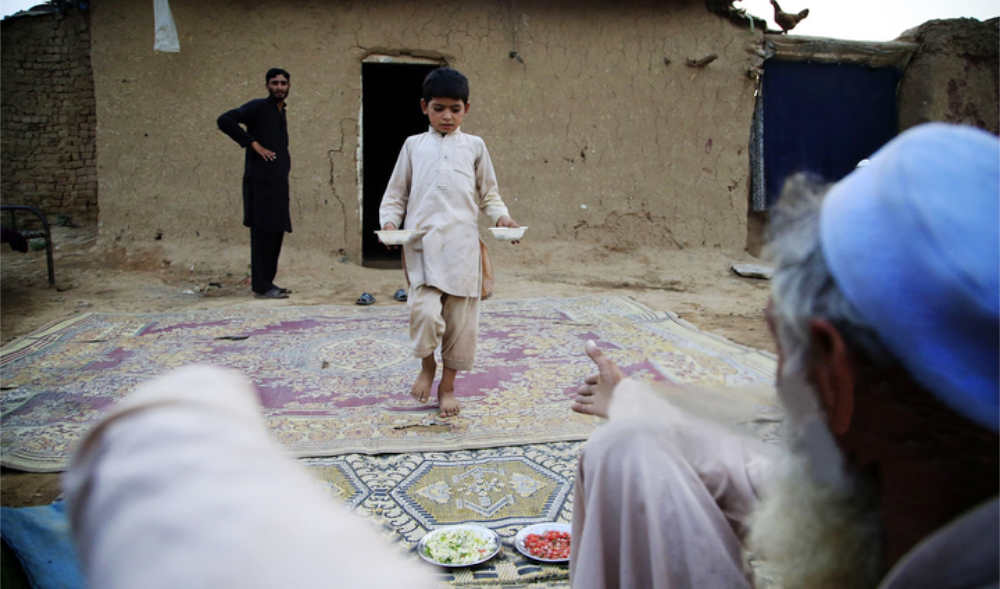PESHAWAR: As Ramadan began in Pakistan last week, Afghan refugee Sajjad Khan remembered the comforts of the holy month of fasting back home, where he enjoyed lavish sahoor and iftar meals surrounded by friends and family and always had enough to give away to the needy.
This Ramadan, he and his family will be breaking their fasts only with home-baked bread and green tea, if they are lucky.
During Ramadan, Muslims all over the world observe a dawn-to-dusk fast, aiming to show patience, modesty and spirituality. The month culminates in Eid Al-Fitr, a festival marking the end of fasting and during which people go to mosques for prayers and visit friends and family to exchange gifts and meals.
But for many Afghan refugees in Pakistan, it will be hard this year to observe the usual rituals associated with this period.
While Pakistan was already home to 1.4 million Afghan refugees when US-led forces left Afghanistan last year and the Taliban seized Kabul, at least 100,000 more have arrived in Pakistan since, according to Qaiser Khan Afridi, a local spokesperson for the UN refugee agency.
“Every Ramadan day in Afghanistan was like Eid day,” 49-year-old Khan, who sells fruits and vegetables at a market in Peshawar, told Arab News. “Now we live a painful life as refugees … My iftar consists of bread and a cup of green tea.”
Khan was a fruit exporter in Afghanistan’s eastern Laghman province, from where he fled with his parents and children only a week after the Taliban takeover last August. Now, he is among dozens of refugees who come to Peshawar’s Board Bazar each morning and spend the day trying to find buyers for their wares.
“I work all day long while fasting and earn 800 rupees ($4.30) to feed my five kids and ailing parents,” he said. “I pray that God protects everyone from refugee life. It makes you feel depressed, people look down upon you.”
However, he said he did not want to return to Afghanistan as long as the Taliban were ruling the country. Despite few opportunities to make a decent living and the scorching Peshawar summers, staying in Pakistan remains a better option.
Afghanistan’s economy collapsed last year after the Taliban takeover, with roughly 23 million people experiencing acute hunger and 95 percent of the population not eating enough food, according to the UN.
“Life is stressful over there with no healthcare or education facilities,” Khan said. “I want to give a good life to my children here.”
Naseemullah Khan, 46, also left Afghanistan when the Taliban seized Kabul.
“I hastily managed to flee to Pakistan and started my life from scratch,” he told Arab News. “I sell fruits and vegetables to support my nine-member family.
“It is difficult, if not impossible, to fast in refugee life.”
Shahid Afghan, who used to own a garment store in Kabul, said he had enjoyed a “comfortable Ramadan” in his hometown, sharing iftar dinners with relatives and friends. Now, he sells children’s clothes at a makeshift stall in Peshawar and can barely make ends meet.
“I hardly manage to get food for my children,” he said. “I will go back (to Afghanistan) once peace returns to my country … fear, hunger and uncertainty continue to haunt people over there.”
Naqeeb Ahmad, a refugee from Nangarhar province, told Arab News he had lost all hope for a better life back home when the Taliban enforced a ban on girls’ education.
“We opted to migrate to Peshawar for the sole purpose of educating my two daughters,” said Ahmad, who owned an import and export business of dry fruits in Afghanistan but now sells vegetables on a roadside in Peshawar.
“Ramadan is really harsh here,” he said. “Sometimes I burst into tears when I am alone… I had fruit, meat and dry fruit on my table to break my fast with. Now I just get home-cooked bread and green tea.
“A refugee’s life is very, very hard. It hurts me daily when I look at the plight of my children.”
The UN’s Afridi admitted there was no government program designed to help refugees get through the month of fasting.
“Afghan refugees are being provided health and education facilities at their camps,” he said. “But we do not have a Ramadan-specific program for them.”




